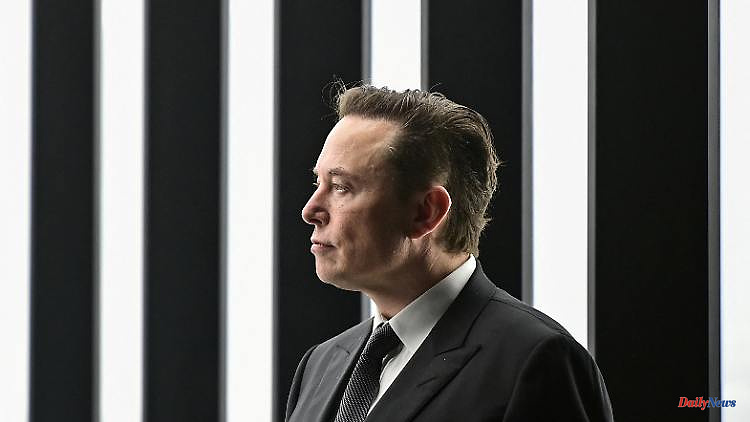Elon Musk no longer wants to buy Twitter. But the company could force him to go through with the deal anyway. That could cost the Tesla founder many billions of dollars.
Elon Musk called off the Twitter takeover. But he could still be forced to buy the company for the agreed $44 billion. For classification: Twitter is currently valued at around 28 billion dollars on the stock exchange.
Twitter management will no longer accept the $1 billion penalty Musk will have to pay if he dumps the deal. In order not to be sued by Twitter shareholders himself, he has no choice but to go to court. "We are committed to completing the sale at the agreed price and will appeal," Board Chairman Bret Taylor tweeted. "We are confident of being successful in Delaware Chancery Court," he added.
This demonstrative optimism is not unfounded. According to experts, Twitter has a good chance of asserting itself. Because the courts in the US state of Delaware, where the dispute is likely to be fought, have set the bar very high for withdrawal from takeovers.
Musk's stride was outlined. In April, the richest person on the planet announced that he had bought 9.2 percent of Twitter shares for almost $3 billion. In one fell swoop, he became the company's largest shareholder. Shortly thereafter, Musk launched a hostile takeover attempt. He announced that he would buy all shares at a price of $54.20 each and delist the platform. The management of Twitter first announced that they would resist the purchase. However, at the end of the month it accepted the offer.
Then Musk obviously got cold feet. In mid-May, he announced that the deal was on hold. He wanted to know the details of how Twitter calculates the number of spam and fake accounts. Musk questioned that these actually make up less than 5 percent of all accounts, as stated by Twitter. This involves so-called bots: computer programs that use algorithms to interact with users and pretend to be real people.
Musk assured that he was still interested in Twitter. But experts doubted it. Social media consultant Thomas Knüwer, for example, told ntv that Musk was "obviously looking for an excuse to get out of the deal". Meanwhile, the stock plummeted. Before the purchase offer, it cost just under 50 dollars, currently it is around 37 dollars.
Twitter then gave Musk access to the entire "Firehouse" data stream - that's more than half a billion tweets a day with unlimited search capabilities. Nevertheless, Musk's lawyers justified the withdrawal by saying that the information on the number of fake accounts was not sufficient. Twitter violated an agreement.
Musk's lawyers argue that Twitter's figure of 5 percent fake accounts is wrong - that means there is a "material adverse effect" (MAE) for the buyer, who can therefore withdraw from the deal.
In Delaware, according to experts, it will be difficult to get through with this justification. Because courts in this state would define MAEs as dramatic, unexpected events that harm a company in the long term. And whether that's true of the possibly inaccurate number of Twitter bots is doubtful. Contracts like the one between Musk and Twitter are designed in such a way that the buyer has only been proven right once in such legal disputes.
It was about the German healthcare group Fresenius Kabi, which had withdrawn from the purchase of the US company Akorn in 2018. At that time, a court found that Akorn's assurances to Fresenius that Akorn had complied with its regulatory obligations were incorrect. In addition, according to the judge, Akorn had withheld facts about a deterioration in his situation. "If it goes to trial, Musk will have a high probability of proving that the spam account numbers were not only wrong, but that they were so wrong that they will have a significant impact on Twitter's future revenue," said Ann Lipton, vice president -Dean at Tulane Law School in Louisiana.
Musk has also criticized Twitter for violating agreements by firing two senior employees without his consent. "That's probably the only point that will stand," said Brian Quinn, a professor at Boston College Law School. However, he doubts that the layoffs are serious enough to affect Twitter's business.
In most cases, the US courts rule in favor of the companies that should be bought. They then order the buyers to close their deals. That was the case in 2001. At that time, the largest chicken processor in the US, Tyson Foods, no longer wanted to buy the largest meat packer, IBP. However, a judge ruled that the deal had to go ahead.
It is also possible that Musk and Twitter management will agree on a settlement in court - and that the Tesla boss will pay a lower purchase price or higher compensation. But it is not clear whether this will succeed.
Twitter is in a difficult position, said law professor Lipton. "They can't just say, 'Okay, let's save the stress. Elon, we'll let you push the price down to $20 a share or accept the $1 billion penalty.' Because then there is a risk for the Twitter managers of being dragged to court by their own shareholders and sued for damages. That means: If things go badly for Musk, he has to sink a lot of money.












